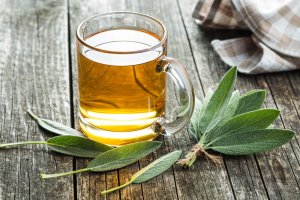A Basil-Sage Remedy to Naturally Cleanse Your Kidneys


Reviewed and approved by the doctor Karla Henríquez
To maintain good health and prevent chronic or degenerative illnesses, it’s important to maintain good life habits, and among these, good hydration.
According to popular belief, to complement your hydration, it’s a good idea to incorporate drinks made from medicinal plants like basil and sage. These two aromatic plants help facilitate kidney function.
Why is optimal kidney function important?
As the experts at the National Institutes of Health suggest, the kidneys contribute to balancing the whole body. This is because they eliminate the waste and excess liquid from our bodies, and as a result, the acid that our cells produce. Furthermore, “they maintain a healthy balance of water, salts, and minerals (like sodium, calcium, phosphorous, and potassium) in the blood.”
Basically, the kidneys are in charge of filtering diverse substances – helping to eliminate those that aren’t necessary – and through that, maintain balance in the whole body. Generally speaking, without good kidney function, you won’t have a balanced body, or good health.
Check out this article Everything You Need to Know About Liver Detox Diets
Do we need to help the kidneys to do their job?
Contrary to what many people believe, healthy kidneys don’t need extra help besides those provided by healthy life habits. However, you can support proper hydration by getting your fluids from wholesome drinks. These will also help you avoid industrial drinks (sodas, flavored waters, teas, alcohols, etc.).
A large number of plants can be good for this purpose but let’s concentrate on basil and sage.
Basil
This isn’t just an aromatic herb that you can use to prepare delicious sauces, salads, and pasta dishes. It’s also a great natural remedy with digestive and relaxing properties that, according to popular belief, you can keep around to make infusions or use as a condiment.
Many people believe that consuming basil regularly within a balanced diet helps to prevent or dissolve kidney stones, as well as improve kidney function and relieve stomach cramps. Furthermore, the experts at the Fundación Española de la Nutrición indicate that“appetite stimulation and digestion facilitation stand out from among its therapeutic properties.”

Likewise, antioxidants abound in basil. The accumulation of free radicals in tissues is associated with cell damage, which increases the risk of chronic and degenerative diseases.
Thanks to these, kidney tissues are protected from the damage that some components that are toxic to the kidneys can cause. At the moment these effects have only been verified in animals.
Sage
This medicinal herb gets its name from the Latin word “to cure.” With that in mind, we can say that the name itself confirms the multiple health benefits that many people in popular culture attribute to this herb!
As stated in an article published in Elsevier, “according to the German E Commission, the leaves have antibacterial, fungistatic and virostatic properties. It’s also astringent and inhibits sweating.”
Alternatively, there are people who consider this aromatic plant excellent when it comes to looking after your kidneys thanks to the diuretic and depurative qualities. Consuming it over time can help us maintain the body by eliminating liquids. This also prevents bloating, inflammation and swelling.
Finally, a wide variety of antioxidant compounds are also present in sage. These can be great for protecting the kidneys and prevent problems such as chronic kidney disease. However, at the moment, the studies are still scarce and conducted with extracts of the plant (much more powerful than the leaves).
Check out A Ginger, Garlic and Honey Remedy for High Cholesterol
A basil and sage remedy to facilitate kidney functioning
You can drink this remedy whenever you want something different and natural, so as to avoid industrial drinks, which only contain large amounts of sodium and sugar and greatly harm kidney health.
Ingredients
- 1 c. of water (200 g.)
- 5 fresh sage leaves (8 g.)
- 10 fresh basil leaves (15 g.)
- 1 tbsp of honey (25 g.)
Preparation
- To prepare this remedy, you’ll need fresh herbs so as to better take advantage of their properties.
- All you have to do is beat, blend, or crush the basil and sage leaves with the water
- Once you have a homogeneous mixture, sweeten with the honey
How to consume it
- To reap the benefits from this remedy, drink it after waking up, on an empty stomach, before breakfast
- You must make this medicinal tonic fresh every morning for a week and consume it right away
- You can do this treatment regularly, but always for a week. In addition, two cups per day should not be exceeded.

Possible contraindications of basil and sage
Both basil and sage are plants that can be consumed safely in the recommended amounts. Taking medicinal plants can have positive effects on the body but could have the opposite effect in high doses.
We recommend not doing this natural treatment without medical supervision if you suffer from any illness or take medication. If you take medication continuously, it’s necessary to consult with the doctor before consuming any natural remedy to avoid adverse reactions.
It’s also not advisable to consume medicinal plants during pregnancy and lactation beyond the amounts you use in your dishes. Similarly, if you have kidney problems, consult your doctor before taking herbal teas and supplements of any kind.
More tips to facilitate kidney function
Good kidney function is based on a healthy lifestyle and diet. Apart from taking purifying infusions from time to time, this is the best way to keep your kidneys healthy and help optimize their daily functions.
To enhance the effects of this infusion we must take into account the following tips:
- Drink plenty of water, outside of meals. The usual advice is to drink about two quarts of water a day. This amount may vary depending on the ambient temperature and the activity of each person.
- Maintain blood pressure and blood glucose at normal levels.
- Follow a kidney-friendly diet, such as the Mediterranean or DASH diet. This is because both encourage the intake of fruits, vegetables, whole grains, fish, lean meat, nuts, legumes, and olive oil. In addition, reduce your consumption of salt and moderate the intake of dairy products, especially fatty ones.
- Exercise to speed up your metabolism and increase sweating to facilitate renal function. In addition, physical exercise allows you to maintain optimal body weight, blood pressure, and cholesterol, which reduces the risk of kidney disease.
- Always cover the area of the kidneys (between the lumbar and dorsal), since these organs are sensitive to cold temperatures. You can apply heat with a mat or water bag if you need it.
- Get regular check-ups.
- Skip the alcohol, tobacco, and over processed junk food.
Incorporate basil and sage into your diet to facilitate kidney function
The health properties of basil and sage have been known for centuries, especially thanks to the practice of traditional medicines such as Chinese or Ayurveda. In particular, it seems they can be good for taking care of the kidneys, although the scientific studies that support this are, at the moment, few and conducted in animals.
For this reason, this remedy should be be a mere practice within a set of positive habits for the kidneys. In no case is it a medical treatment and should never replace medical advice.
It’s best to consult a health professional if you have any symptoms or doubts about kidney health. This is especially true if you already have a problem with this organ and you want to introduce this infusion into your daily habits.
All cited sources were thoroughly reviewed by our team to ensure their quality, reliability, currency, and validity. The bibliography of this article was considered reliable and of academic or scientific accuracy.
- Alomar M, Y. Physiological and histopathological study on the influence of Ocimum basilicum leaves extract on thioacetamide-induced nephrotoxicity in male rats. Saudi Journal of Biological Sciences. Julio 2020. 27 (7). 1843-1849.
- Hernández-Agero T, Carretero Accame Mª T, et al. Salvia. Fotoquímica, farmacologia y terapéutica. Farmacia Profesional. Julio 2002. 16 (7): 59-64.
- National Kidney Foundation. 7 reglas de oro para la prevención de la enfermedad renal.
- Nash, R. J. (2002). Sage: The Genus Salvia. Phytochemistry.
- Neimat Allah S, Haggag M, et al. Effect of aqueous extract of sage and marjoram on chronic kidney patients. Egyptian Journal of Applied Sciences. Noviembre-Dicimebre 2020. 35 (11): 186-201.
- Opalchenova, G., & Obreshkova, D. (2003). Comparative studies on the activity of basil – An essential oil from Ocimum basilicum L. – Against multidrug resistant clinical isolates of the genera Staphylococcus, Enterococcus and Pseudomonas by using different test methods. Journal of Microbiological Methods.
- U.S. Department of Health and Human Services. (2009). The Kidneys and How They Work. National Institutes of Health.
- Walch S. G, Kubulla Th, et al. Determination of the biologically active flavor substances and camphor in foods and medicines containing sage (Salvia officinalis L.). Chemistry Central Journal. Julio 2011. 5:44.
This text is provided for informational purposes only and does not replace consultation with a professional. If in doubt, consult your specialist.








